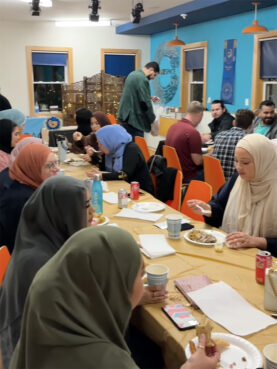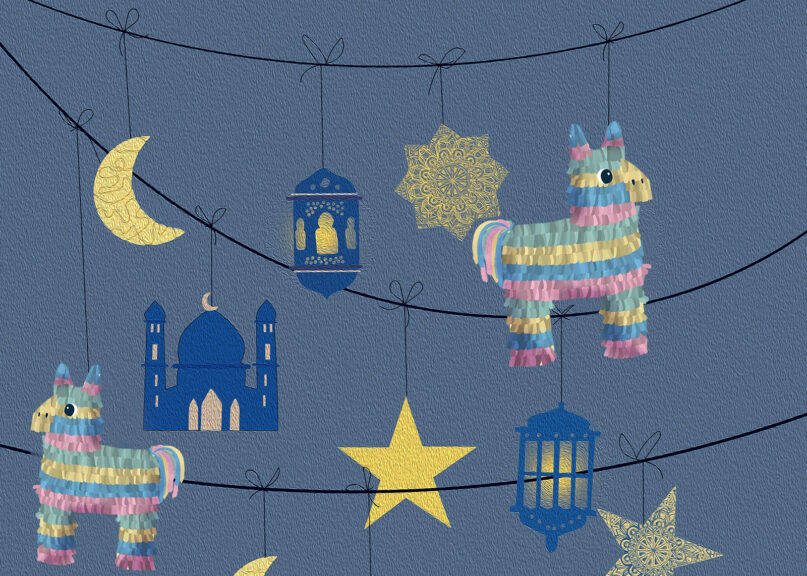(RNS) — When the sun sets and it comes time to break her fast, Wendy Díaz always has all of her favorite Puerto Rican and Ecuadorian dishes ready: arroz con gandules, arroz con pollo and empanadas, the fried dough pockets she finds particularly appropriate for Iftar because of their crescent shape, a common evocation of Islam’s lunar calendar.
“It’s the intersection of Islam and Latininad; it’s a whole celebration of food and culture in our house,” she said of her Iftar preparations.
Since Díaz, who was born in Puerto Rico and raised Catholic, converted to Islam more than 20 years ago, she is accustomed to merging the codes of Hispanic and Islamic cultures.
It hasn’t always been as celebratory as her empanadas. Mixing Puerto Rican cuisine with the requirements of halal cooking — the dietary restrictions set by Islam — often takes some creativity. The primary obstacle, she said, is Latino dishes’ deep reliance on pork.

Wendy Díaz with her book “Eid Empanadas.” (Courtesy photo)
But Díaz takes joy in devising ways to combine elements of her Latino and Caribbean heritage with her religious practices. For Eid al-Fitr, the celebration marking the end of Ramadan, she plans to decorate her house with pińatas. Three years ago, when Eid fell the same week as Cinco de Mayo, when Mexicans celebrate their independence from France, she recycled the colorful Cinco de Mayo accessories for her Eid decorations.
There are approximately 250,000 Latino Muslims in the U.S., about half of them former Catholics. If Ramadan is an occasion for them to celebrate their newfound religion, it’s also a challenging time for converts who can’t always share their practices with their families.
When Díaz converted to Islam in the early 2000s, being a Latina Muslim was less common even than it is today. According to the 2020 U.S. Mosque Survey of the Institute for Social Policy and Understanding, only 6% of Muslim converts were Latino in 2000, compared to 15% in 2020, making them the fastest-growing group among American Muslims.
This rapid growth is reflected in the increasing number of Spanish-language resources about Islam available today, far different from when Díaz converted to Islam, she noted.
She first became interested in Islam after reading a biography of Muslim Civil Rights figure Malcolm X, as well as the influence of a friend from high school who was raised in a Muslim Egyptian family. She went on to learn a lot by herself as she found few books in her maternal language to deepen her knowledge.
“A lot of converts to Islam had to do things on their own,” she said.
She officially became Muslim two months before her first Ramadan and remembers being quite intimidated by the fasting practice as she didn’t know much about it yet.
“I was actually very afraid that I wouldn’t be able to do it because I didn’t know exactly how to fast. I had observed my friend and her family fasting, but I didn’t know all it entailed,” she said.
For Hazel Gomez, a Puerto Rican and Mexican Muslim who lives in Detroit, the first Ramadan was also challenging. It was during the fall of 2003, when she was in college, and since she didn’t know all the rules, she continued to eat and drink as the sun rose. “I was essentially fasting incorrectly,” she remembered, amused.
Still, she has fond memories of that first Ramadan because of the support and help she received from her local Muslim community.
She explained that embracing her dual identity wasn’t easy at first and took time for her to get used to. “I remember that feeling of trying to navigate my Latinidad and hold on to who I am while balancing this faith,” she said.
But converting to Islam, for Latino folks, shouldn’t mean leaving a part of their identity behind, she explained.

Hazel Gomez. (Courtesy photo)
Gomez, who was raised Roman Catholic, explained that Jesus and the Virgin of Guadalupe still hold a special significance for her. The day she converted and recited the Shahada, the Islamic declaration of faith, her Imam added a special line mentioning that besides worshipping Allah and his prophet Muhammad, she would also believe in the Prophet Jesus and Mary the Virgin. This nod to her cultural and religious background made her emotional, she recalled.
Later, when she started wearing the hijab, she felt like she was walking in Mary the Virgin’s footsteps by covering her hair, too.
“The beauty is that we’re not expected to commit cultural apostasy when we convert to Islam. On the other hand, what’s expected is that we beautify our culture. We’re able to beautify our culture through our faith practice,” she said.
Ramadan, for Gomez, offers a perfect occasion to celebrate this dual culture through food. In Chicago, she and her family used to attend potluck iftars where participants brought plates from their home countries. These dinners always reminded her how diverse the Muslim community is.
“When people think of Muslims, sometimes they just think of maybe Arab food and think of hummus or falafel, but tacos and rice are also Muslim food,” she said.
Potluck iftars are very common, especially among Muslim converts who can feel isolated, and more organizations are planning “community iftars” specifically for them.

Attendees partake in an iftar organized by the DMV Latino Muslim Association, Saturday, March 30, 2024, in Alexandria, Va. (Video screen grab)
The DMV Latino Muslim Association recently organized a “potluck iftar” at the end of March to offer a support group to Muslim converts who felt isolated. The organization also held workshops in the weeks leading to Ramadan to help new Muslims better understand holy month, as well as the challenges of the convert life.
These spaces where Latino Muslims can find each other and exchange their experience are essential, said Gomez. When she first converted, she studied Islam at the Al Azhar University of Cairo in Egypt during a monthlong program designed specifically for Latino Muslims.
“I saw the benefits of people who are Latino understanding their faith, especially when it comes to navigating cultural things and religion,” she said.
Gomez tries to help other new Latino Muslims as much as she can. Recently, she helped a 60-year-old woman from Puerto Rico recite her Shahada. Whenever she hears about Latino Muslims who recently converted and are in her area, she reaches out, offering advice on how to navigate Islam and their Latino identity.
Díaz also finds it meaningful to help new converts in their journey. In November, she participated in the first edition of the Hispanic Muslim Day organized by the Islamic Society of Baltimore Mosque, where she was one of the main speakers and represented Hablamos Islam (We Talk Islam), the organization she co-founded in 2005 to educate Hispanic communities about Islam.
Being surrounded by other Latino Muslims is important for new converts, explained Díaz. At least once per Ramadan, she also does “Latino iftar,” when she breaks fast with other Muslim friends and their families — hailing from Guatemala, Mexico and El Salvador — who also live in the D.C. area.
“The thing about the DMV is that there are Latino Muslims here, but we’re very scattered. So in recent years, we’ve tried to get together,” she said.
Even if being Latino and Muslim is more common today, few representations exist for Latino kids raised in Muslim families. Díaz and her husband, a Muslim born in Ecuador, noticed it a few years ago when they started looking for books for their two kids that not only talked about Islam in Spanish but also put the spotlight on families like theirs.
That’s why Díaz wrote “Eid Empanadas,” a book that tells the story of “Omar Hernández, a not-so-average Muslim student.” She was hoping to empower Latino kids who celebrate Ramadan in “cross-cultural families” like hers by offering them more representation.
“That book showcases a Muslim Latino family and how they spend Ramadan and the challenges that they face as a minority within the Islamic community,” she said.
Gomez also strives to show her three sons the beauty of their dual identity. During a recent Ramadan, a friend gifted them a “Feliz Ramadan” (Happy Ramadan in Spanish) calendar with a Quranic verse and candies for every day of the holy month.
“They’re learning who they are. They know that they have multiple identities and that their multiple identities are represented within their Islamic upbringing,” she said.
For Eid al-Fitr, Gomez plans to listen to the Khutbah, the Eid sermon, given by Puerto Rican Imam Hamza Perez, at her local mosque.





